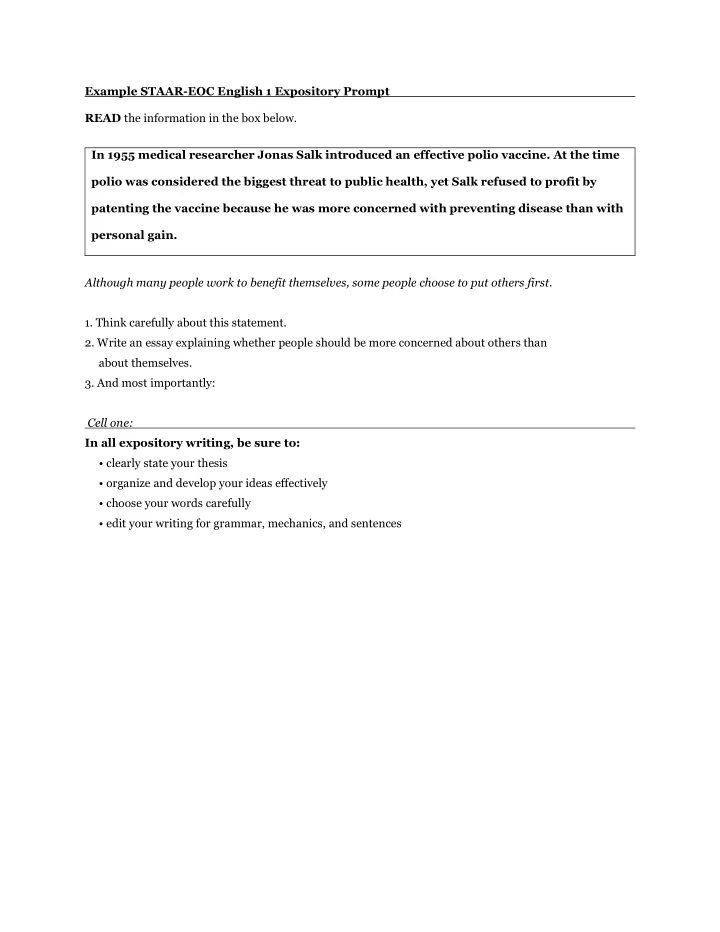

Example STAAR-EOC English 1 Expository Prompt READ the information in the box below. In 1955 medical researcher Jonas Salk introduced an effective polio vaccine. At the time polio was considered the biggest threat to public health, yet Salk refused to profit by patenting the vaccine because he was more concerned with preventing disease than with personal gain. Although many people work to benefit themselves, some people choose to put others first. 1. Think carefully about this statement. 2. Write an essay explaining whether people should be more concerned about others than about themselves. 3. And most importantly: Cell one: In all expository writing, be sure to: • clearly state your thesis • organize and develop your ideas effectively • choose your words carefully • edit your writing for grammar, mechanics, and sentences
Example Essay A: Thinking about others before you is a nice thing to think of, but if you think of yourself first it makes you feel isolated. Caring about others before you isn’t a bad thing, but thinking about yourself isn’t bad either. To me I think of others before me. Some people have the good life, others don’t. I’ll rather put myself in danger than others being in danger as well. I’m only one person but risking myself could save more than one life. When your in a room where there seems to be a fire some people will think of themselves while others think of the rest. The doctor could risk himself of getting polio but he could save hundreds of lifes that currently have polio. To me people that think of themselves before others are selfish and maybe greedy, but others that think of others are kind people. Example Essay B: Humanity has a funny way of contradicting itself sometimes. All children are taught to share and put other’s needs before our own. Somewhere down the line we realize that the very people who preach these things don’t follow their own rules. It is very important in society to remember the bigger picture, which often includes doing things to help others with no benefit to yourself. People use each other for personal gain all the time. A glorified outlook on this way of life is all around us. In media, people are more concerned with which Hollywood star is going out with which millionaire rather than the thousands of people dying of hunger in third world countries. As consumers, we see this life and wish to be like that. Doing something for monetary gain is just like money itself: easily expendable and transient. But doing something to help others leads to emotional or moral gain. The memories and feelings you get from helping others won’t ever go away. It’s worth something to you. Worth more than money ever could be.
Cell two: A basic essay has usually at least 3 paragraphs: an Introduction, a Body, and a Conclusion. • The introduction will include the overall thesis. • The body paragraphs will have a topic sentence connecting the thesis and the development of the ideas. • The conclusion paragraph will summarize or explain an overall importance. Cell three: You already know a thesis can be expressed as a value claim . The thesis is the overall point you are trying to make about the prompt or question. A thesis is important in an essay because ______________________. Basic Body Paragraph Give evidence and analysis to explain yourself. This is one way of developing a body paragraph. Cell four: Some ways to develop a body paragraph: Examples from real life situations Definitions of complex ideas Comparisons Contrasts Combination of all the above Cell five: Basic Conclusions end the essay by giving a sense of importance and completeness to the idea. Your most important point is expressed in the final paragraph. Cell six: Argumentative/Persuasion: (editorial in a newspaper.) • argue values • defends an opinion backed up with three claims • clarifies why something should or should not happen. Editorial in the newspaper. Cell seven: Expository: (examination of the importance of a figure in history) • expresses your own point of view • explains a historical event • autobiographical situation • or provides a fictional narrative to explain a hypothetical situation • shows opinion but backed up with historical, social, or scientific facts • educates people on a situation or person
Recommend
More recommend